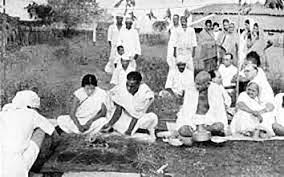The All India Harijan Sangh was founded in 1932 by Mahatma Gandhi with the aim of working for the welfare of the Harijan community, also known as Dalits. The term “Harijan” means “children of God” and was used by Mahatma Gandhi to refer to the untouchable castes in India. The organization worked towards the upliftment of Dalits, providing them with education and employment opportunities, and fighting against discrimination and untouchability.

Table of Contents
History of All India Harijan Sangh
Mahatma Gandhi was deeply concerned about the social and economic discrimination faced by the Dalit community in India. In 1932, he announced the formation of the All India Harijan Sangh to address these issues. The organization was founded with the primary aim of providing social and economic upliftment to the Dalit community. Dr. B.R. Ambedkar, who was himself a Dalit leader, was initially opposed to the idea, as he felt that it would lead to the further marginalization of the Dalit community. However, he later supported the organization and worked with Mahatma Gandhi towards the upliftment of the community.
Objectives
It had the following objectives:
- To provide education and employment opportunities to the Dalit community.
- To work towards the abolition of untouchability and discrimination against Dalits.
- To promote the economic, social, and cultural development of the Dalit community.
- To work towards the establishment of a society based on the principles of equality, justice, and brotherhood.
Achievements of All India Harijan Sangh
It played a significant role in the upliftment of the Dalit community in India. Some of its achievements include:
- Establishment of schools and hostels for Dalit children.
- Provision of vocational training and employment opportunities to Dalit youth.
- Organization of campaigns and protests against discrimination and untouchability.
- Advocacy for the rights of the Dalit community at the national and international level.
Conclusion
The All India Harijan Sangh played an important role in the upliftment of the Dalit community in India. Its efforts towards the abolition of untouchability and discrimination against Dalits, and the promotion of their economic, social, and cultural development helped in creating a more inclusive society. Although the organization is no longer active, its legacy continues to inspire the struggle for the rights and dignity of the Dalit community in India.
Important Links